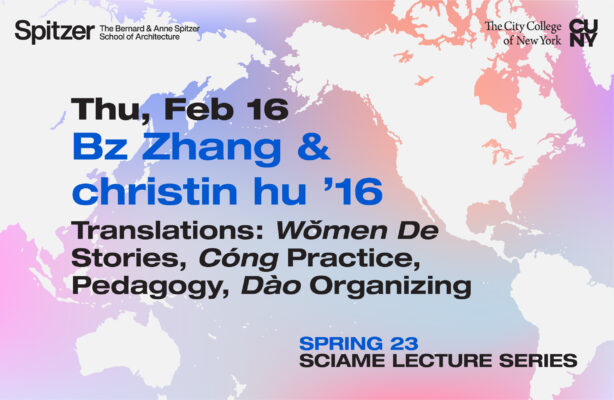News
Spring 2023 Sciame Lecture Series: Bz Zhang & christin hu ’16
This lecture was held on 02/16/2023 and was part of the Spitzer Spring 2023 Sciame Lecture Series, titled “Across the Pacific Rim: Architecture and Landscape in Translation.”
Bz Zhang 张迪 is an architect, artist, organizer, and educator from Lenapehoking (纽约 New York), 安徽 Anhui, and 山东 Shandong, currently based in Tovaangar (洛杉矶 Los Angeles). They are a core organizer with the Design As Protest Collective and Dark Matter U, a project manager with the Los Angeles Neighborhood Land Trust, and a licensed architect in California. Their design and research practice wonders aloud about representations of violence and the violence of representations by asking questions both using and about disciplinary tools of art and architecture. Bz holds degrees from the University of California, Berkeley, and Brown University.
christin hu 胡潇嶙 of 广西桂林 (Guilin, Guangxi) and 安徽合肥 (Hefei, Anhui), is a designer and coordinator from Lenapehoking (New York, New York). Through accessible games for collaborative design, critical learning methods, and facilitated workshops, they help others build genuine relationships with one another and our shared environments. christin currently works as a Visiting Assistant Professor at Pratt School of Architecture, organizes within the Design as Protest Collective and Dark Matter U, and supports local food justice efforts. They hold an MLA from Harvard GSD and BArch from The City College of New York.
“Translations: wǒmen de stories, cóng practice, pedagogy, dào organizing”: is a series of stories offering students models of practice that embody translation in our work as designers, organizers, and educators in the architecture and landscape architecture fields. These stories trace specificities of our lived Chinese-diasporic experiences through individually and collectively authored projects, ranging from designing cooperative games to looking for Chinese rural settlements in archival fire insurance maps to organizing with collectives. Prompted by questions about accuracy and precision, intent and impact, and the limits of translation, the lecture itself can be understood as a set of diasporic translations. Many of us from diasporas begin practicing translation early in life, navigating multiple verbal and body languages, conflicting cultural values, and even creating new languages such as Chinglish. As these practices evolve over time and space, the joyful coexistence of a multitude of perspectives deepens our relationships with one another and the world. Translating is relating! Ultimately, our aim is to use diasporic practices of translation to frame a conversation with students about future models of design practice, pedagogy, and organizing.


